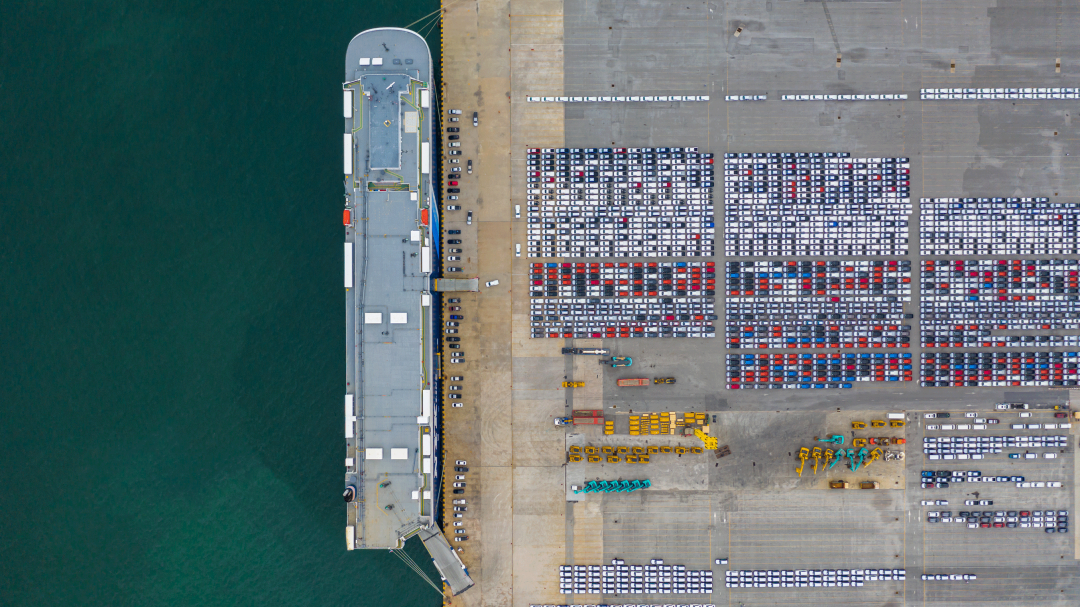Shanghai ports see rising vehicle exports in Q1
- Details
- By David Cao
- Hits: 528

Shanghai ports exported 529,000 vehicles in the first quarter of 2024, up 30.7 percent from the same period last year, Shanghai customs said Thursday.
During the period, the customs in the city's Waigaoqiao port area handled more than 280,000 exported vehicles, an over 20 percent year-on-year increase.
Volkswagen speeds up investment in electric vehicles in China
- Details
- By David Cao
- Hits: 622

Volkswagen's new electric SUV (ID.UNYX) will debut in Beijing Auto Show 2024.
In the face of China's rapid growth of electric mobility, Volkswagen Group is revving up its investment in the electrification shift in a bid to expand its presence in the Chinese market.
Read more: Volkswagen speeds up investment in electric vehicles in China
China urges universities to add majors that meet social needs
- Details
- By David Cao
- Hits: 926

China's Ministry of Education has issued a circular urging universities across the country to plan ahead to add majors that meet social needs, in a bid to further improve the undergraduate program setup.
Read more: China urges universities to add majors that meet social needs
GOKKO brings Smartphone Short Dramas to Japan by partnering with a Chinese company
- Details
- By Nikkei
- Hits: 618

Leading Short Drama provider - Reelshort
In Japan, vertical short dramas for smartphone viewing will be launched. Japanese startup GOKKO is partnering with a Chinese company to launch nearly 60 episodes of short dramas this month. According to reports, the size of China's short drama market is nearly 1 trillion yen (100 million Japan Yen is about 4.68 Chinese Yuan), and short dramas are also increasingly popular in the United States. Short dramas with only 90 seconds per episode have the potential to be promoted in Japan, especially among young people who efficiently utilize their time.
Read more: GOKKO brings Smartphone Short Dramas to Japan by partnering with a Chinese company
German Blickle Tells the way to run business in China
- Details
- By Wirtschaftswoche
- Hits: 584

Fabian Hanler spent 10 years in establishing the Chinese subsidiary of the German company Blickle. The company is an invisible champion in manufacturing wheels and rollers. In the interview, he explained what is important to be a manager in China.
Read more: German Blickle Tells the way to run business in China
China’s Overcapacity Poses Risks to World Economy?Janet Yellen is Wrong.
- Details
- By Xinghua Dabai
- Hits: 639

"Overcapacity can lead to large volumes of exports at depressed prices,"
The United States and the European Union define "overcapacity" as production capacity that exceeds domestic demand, which is an extremely narrow definition. If each country's production only meets domestic market demand, there will be no cross-border trade.
Read more: China’s Overcapacity Poses Risks to World Economy?Janet Yellen is Wrong.
Chinese EV makers step in global expansion
- Details
- By David Cao
- Hits: 613

HiPhi debuted in Beijing Auto Show 2020
The Ministry of Industry and Information Technology, China's top industry regulator, said in an exclusive interview with China Daily that it will step up efforts to encourage Chinese new energy vehicle enterprises to accelerate overseas development, warning that the restrictive measures imposed by a "certain country and region" on Chinese electric cars will undermine interests of global consumers.
Nubia releases new AI and foldable smartphone
- Details
- By David Cao
- Hits: 659

Chinese smartphone manufacturer Nubia Technology unveiled three artificial intelligence-powered smartphones on Tuesday, in a bid to grab a bigger slice of the pie in the highly competitive handset market.
Alibaba returns to simple and agile structure
- Details
- By David Cao
- Hits: 609

Jack Ma, co-founder of Chinese tech heavyweight Alibaba Group Holding Ltd, affirmed on Wednesday the courage Alibaba's new leadership team had to embrace new changes, saying the company has returned to a healthy growth track and will continue to innovate.
Huawei Harmony OS will lead China into a new era
- Details
- By David Cao
- Hits: 712

According to Huawei's latest report, as of December 31, 2023, the number of HarmonyOS ecological devices has exceeded 800 million, the total number of developers has exceeded 2.2 million, students in 305 Chinese universities have participated in HarmonyOS activities, 135 Chinese universities have opened HarmonyOS campus public courses, 286 Chinese enterprises have participated in HarmonyOS ecological schools, and over 380000 developers have passed HarmonyOS certification. China's HarmonyOS ecosystem has officially formed.
Xiaomi SU7 EV Surpass Apple Car
- Details
- By David Cao
- Hits: 460

In the evening of March 28, Lei Jun officially released Xiaomi SU7 at the Xiaomi Auto Launch Conference, and announced the price of Xiaomi SU7 that affected the hearts of the entire Internet: Xiaomi SU7 is 215,900 CNY; Xiaomi SU7 Pro is 245,900 CNY; Xiaomi SU7 Max is 299,900 CNY. Lei Jun revealed after the press conference that 100,000 people added wishlists in one minute after the Xiaomi car press conference, and the number of orders exceeded 10,000 in four minutes. As of press time, it took 27 minutes to officially launch (at 22:00 on the 28th) and 50,000 units were booked with down payment.
EV to help China become leading vehicle export power
- Details
- By David Cao
- Hits: 1241

MG, short for Morris Garages, a vehicle brand owned by SAIC Motor Corporation Limited
Ships loaded with 10,000 MG4 electric vehicles left Shanghai's Haitong port for Europe on Tuesday, marking China's largest single shipment of EVs bound for overseas markets.
In the fourth quarter, the hatchback is expected to be sold in around 20 major nations on the continent. By 2023, it will be available in some 80 countries around the world, said SAIC President Wang Xiaoqiu on Tuesday at the model's launch ceremony in Shanghai.
Read more: EV to help China become leading vehicle export power
China's shipbuilding sector continues to top world market
- Details
- By David Cao
- Hits: 969

On April 13, the Bacalhau floating production, storage, and offloading vessel hull and living building project (FPSO-8) built by DSIC, a subsidiary of China State Shipbuilding Corporation, successfully completed the docking!
Read more: China's shipbuilding sector continues to top world market
More Articles …
Page 3 of 7